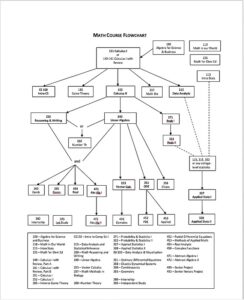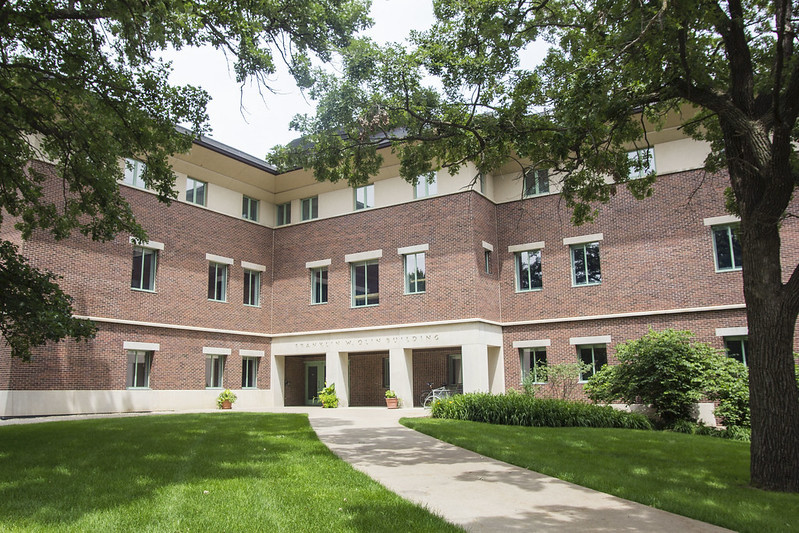Mathematics Department
Mathematics is the:
- study of numbers, measurements, patterns, shapes, equations, relations, functions, change, symmetry, structure, sets and operations
- modeling of physical phenomena to better understand and predict nature
- development of theorems from accepted axioms through logical proof
Mathematics is the primary language and theoretical foundation of modern technology and is an extremely versatile course of study. Mathematics majors are encouraged to explore applications of mathematics in other disciplines, and it is a popular second major for students pursuing advanced degrees.
Studying mathematics also helps you:
- Develop critical thinking skills–including mathematical and logical reasoning skills and problem solving abilities
- Learn about formal theories so you understand that mathematics is a logical, deductive system based on definitions, axioms, examples, theorems, and proofs
- Improve your ability to apply mathematics to a variety of disciplines and recognize that problems motivate the development of new mathematical theory and methods
- Prepare the foundation needed to pursue advanced degrees or careers in business, industry, and education
- Express mathematical ideas in written and verbal forms
- Explore opportunities for independent projects and research experiences in mathematics
Statistics is the science of reasoning from uncertain empirical data. Statisticians build mathematical models to solve problems in business, the natural sciences, and the social sciences. The mathematics/statistics major provides adequate preparation to attend graduate school in statistics or to pursue a career such as actuary, data scientist, statistical analyst, etc.
More Information about the Mathematics Major
Foundational
- 365: Geometry
- 454: Real Analysis
- 456: Complex Analysis
- 471: Abstract Algebra I
- 472: Abstract Algebra II
Applied
- 253: Multivariable Calculus
- 257: Mathematical Methods in Biology
- 351: Ordinary Differential Equations
- 452: Partial Differential Equations
- 453: Methods of Applied Mathematics
Statistics
- 271: Probability & Statistics I
- 322: Probability & Statistics II
- 327: Applied Statistics I
- 328: Applied Statistics II
Suggested paths for majors planning careers in the following areas:
- Graduate study in mathematics: A math major including 271, 351, 454, 456, 471, 472
- Statistics: A mathematics/statistics major
- Actuarial Science: A mathematics/statistics major plus economics 247 and 248, management 353 and 365, and courses in computer science
- Computation: 220, 271, 322, 351, 471
- Management (accounting, economics): 253, 271, 322, 327, 454
- Science: from 253, 257, 271, 322, 327, 328, 351, 452, 453, 454, 456, 471

Luther offers a math/stats major, which pairs foundational mathematics courses with four upper-level statistics courses. The upper-level statistics courses are all taught by a Ph.D. statistician. This major provides solid preparation for students interested in studying statistics in graduate school, and is also a great choice for students interested in actuarial science or many of the other careers that require statistical analysis.
Students in the Mathematics/Statistics degree program master skills in statistical theory, interpretation and display of complex data, and computing. This major places an emphasis on applying statistical tools to real-world problems.
Recent graduates from the program have gone on to jobs in private industry and consulting, while others attend graduate school in some of the nation’s top graduate programs.
For more details on the actuarial profession (a profession consistently rated as one of the best), visit www.beanactuary.org.
The senior project in mathematics is intended to be a culminating, independent experience of the mathematics major. Students must select a member of the mathematics faculty to serve as their supervisor. In consultation with this supervisor, the student should choose a mathematical topic to study for the senior project. The project must be presented in a written paper, as well as in a public oral presentation.
Senior Project Proposal
Students wishing to complete a senior project in mathematics must submit a senior project proposal form, which must be approved by the mathematics department.
The above proposal form must be completed by the second Friday of the semester in which the senior project will be completed. You will need your project supervisor’s approval before finalizing your proposal form, so it is highly recommended that you begin this process much earlier than the due date!
Recent Mathematics Senior Project Titles
The following is a list of some recent titles of senior projects, which may give you some idea of the nature of what can be studied for the senior project.
Math
- The Mathematics Behind Musical Instruments
- Combinatorial Game Theory of Nim
- Surface Climate Model as a Function of Time and Latitude
- The Method of Lines on Laplace’s Equation
- Group Theory and Abstract Algebra in Puzzles
- Cryptography: From Caesar to Enigma, and RSA to Now
- Fourier Analysis of Musical Timbre
- Modeling the Capabilities of a Baseball Helmet for the Prevention of Head Injury
- Difference Sets and Maschietti’s Theorem
- Mathematical Analysis of the Fast Fourier Computer Algorithm
- A Mathematical Model for Garbage Production in Delmas 33, Zone Siloe using Ordinary Differential Equations
- This Is What Math Sounds Like: Mathematical Modeling of the Human Ear
- Optimal Control of Dengue Fever Epidemics
- Quantum Computing Algorithms
- Leonhard Euler: Life and (a Few) Works
- The Chinese Remainder Theorem and Its Application to the RSA Algorithm
- An Introduction to Elliptic Curve Cryptography
- A Manhattan Perception of Distance
- Perfect Shuffles and the Resulting Permutations
- Coding Theory
- Rubik’s Cube and Group Theory
- Three Theorems on Nonstandard Dice
- A History of Fermat’s Last Theorem and an Introduction to Elliptic Curves
- Legendre Symbols and an Application to Coin Flipping
- The Mathematics of Check Digits
Math/Stats
- Analysis of Breast Mass Characteristics and their Diagnoses using Multiple Logistic Regression, Cross Validation and Other Statistical Analysis
- Statistical Analysis of Fantasy Football Scores and Projections
- Model for Predicting the Quality and the Color of Wine
- Quantifying Volume of Suitable Habitat for Downstream Migration of Chinook Salmon and Steelhead at Head-of-Reservoir of Shasta Lake, California
- Statistical Analysis of Global Warming Factors Compared Across World Regions
- Predicting the Likelihood of a Turnover in Men’s College Ultimate
- Take a penny leave a penny: a statistical analysis of loose change
- The Effects of Various Caffeine Doses as Related to Endurance and the Exploration of Caffeine Content in Soda
- A Search for Predictive Indicators of Win Percentage in Major League Baseball
- In the Red: A Statistical Analysis of Undergraduate Debt from 2012-2013
- A Multiple Linear Regression Model for Survival Times of Primary Biliary Cirrhosis Patients
- ADHD Diagnosis and Status Characteristics in the Classroom
A Luther mathematics or math-statistics major provides a broad and strong foundation for building career opportunities in a wide range of professions. Luther mathematics graduates find employment in fields as diverse as accounting, banking, editing, engineering, human resources, insurance, software development, and teaching. Many also become small business owners. In addition, the mathematics degree is excellent preparation for an advanced degree in pure and applied mathematics; the physical, biological, and social sciences; engineering; and professions such as medicine and law.
According to the National Association of Colleges and Employers (NACE), graduates with a mathematics major nationwide most commonly obtain careers in the following fields:
- Education (elementary, middle, secondary, postsecondary teacher)
- Finance/insurance (accountant, actuary, auditor)
- Information systems (computer programmer, software developer)
The most common occupational fields among Luther graduates with a mathematics major include:
- Computing/information systems
- Research and development
- Insurance (actuary, sales)
- Engineering (industrial)
Luther mathematics graduates are frequently hired by the following organizations:
- Mayo Clinic
- 3M
- Target
- Best Buy
- Epic
- IBM
- Various insurance and software companies
The Luther Career Center is an excellent resource for students exploring career options.
The following resources also provide information regarding careers in mathematics.
- Career Profiles (American Mathematical Society)
- Careers and Math (WeUseMath.org)
I’m a more thoughtful person than I was prior to attending Luther, and I feel that I am now a better consumer, citizen, and human because of it.
Dallas Wulf '12
The analytical approaches that I apply to my work assignments at NASA are the same as those I originally honed in the Luther physics department. Luther also made me a much better communicator. I frequently give technical presentations at work and find that I’m very comfortable presenting to large groups. My Luther education gave me a great deal of self-confidence and taught me self-sufficiency.
Todd Brown '06
Franklin W. Olin Building
The Franklin W. Olin Building is a state-of-the art academic building that houses the economics, management, accounting, mathematics, and computer science programs.
Contact Information
Mike Johnson
Associate Professor of Mathematics
Mathematics Department
Office
Olin 305
700 College Drive
Decorah, Iowa 52101
Phone: 563-387-1678
